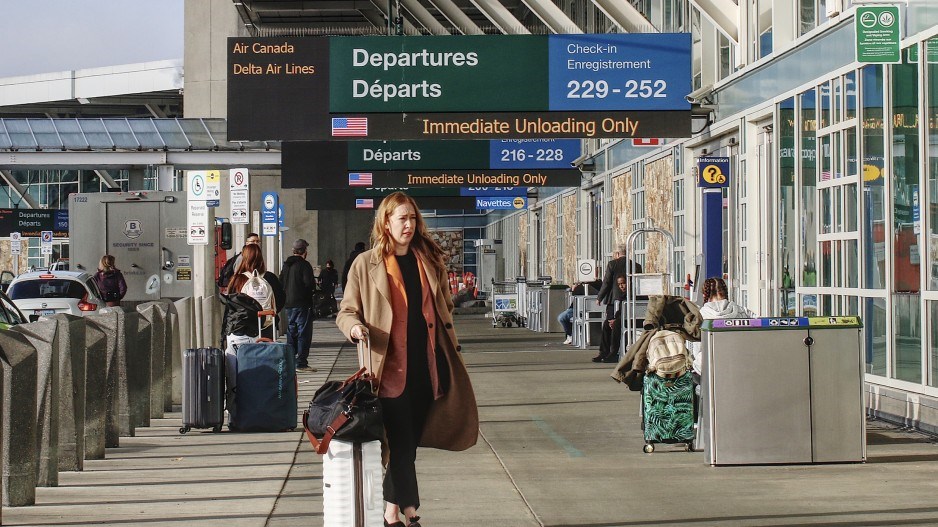Canadian tourism and hospitality businesses have seen a boom in sales from foreign visitors as global travel continues to soar.
Statistics Canada data released Friday show international travellers spent $7 billion in Canada in April, May and June – almost twice the $3.6 billion that they spent in the second quarter last year.
The spending also exceeded the $6.3 billion that international visitors spent in Canada in the second quarter of 2019, before the COVID-19 pandemic disrupted travel. The 2019 spending level, however, was not adjusted for inflation, which rose to a 39-year peak of 8.1 per cent in mid-2022, and has remained high. B.C. inflation last month was 2.3 per cent.
International visitors have long been disproportionately responsible for tourism-spending growth within Canada, with spending increases proportionally more than Canadian-resident tourists for hotels, food and travel.
Nonetheless, year-over-year spending by international visitors was up regardless of geography.
American visitors spent $3.8 billion in Canada in the April-through-June period, up 94.2 per cent compared with the same months in 2022, Statistics Canada said. Other international visitors spent $3.1 billion in the quarter, up 89.1 per cent from the same quarter in 2022, according to the nation's number cruncher.
"Residents of the U.K. ($417.7 million), India ($321.1 million) and Mexico ($293.2 million) together accounted for nearly one-third (32.8 per cent) of total spending by overseas visitors in the second quarter," Statistics Canada said.
"Accommodations ($1.1 billion) was the largest spending category in the second quarter, followed by food and beverages ($793.3 million) and transportation within Canada ($422.9 million). Together, these categories represented nearly three-quarters (73.2 per cent) of total spending by overseas visitors in Canada."
The spending boom has likely continued into the autumn.
Statistics Canada this morning released data showing that in October, 4.6 million passengers passed through pre-board security screening at checkpoints operated at Canada's eight largest airports. This was up 14.6 per cent from October 2022, and 1.6 per cent from the same month in 2019, before the COVID-19 pandemic.
Last month was the first month in which the number of screened passengers on non-United States international flights surpassed 2019 levels. The domestic sector reached that milestone in May 2023. Screened traffic for flights between Canada and the U.S. in October was 3.3 per cent below what it was in that month in 2019, according to Statistics Canada.
Russell Atkinson, Vancouver Airport Authority's director of air service development, told BIV that the total number of seats on planes slated to use Vancouver International Airport (YVR) this winter is up nine per cent, compared with last year.
Helping Air Canada's international passenger count into and out of Vancouver this winter is its new four-times-per-week YVR-Dubai flights, the airline's managing director for international sales planning, Timothy Liu told BIV.
He said his airline intends to increase frequency on its route between YVR and Hong Kong – to 11 times per week, up from daily flights currently.
Some "additional capacity" has also been put on the YVR non-stop flights to Tokyo's Narita International Airport, he said.
Air Canada plans to have seasonal non-stop flights to Bangkok between December and April, which is a slightly longer season than in the inaugural year for that route last year, which was between December and March 26, Liu said. The airline in 2022 initially intended last year's seaonal flights to go into April, but then cut the season short.
His airline then plans to launch non-stop flights out of Vancouver to Singapore four times per week starting April 3.
Total seat capacity on planes out of Vancouver to U.S. destinations this winter is set to be up 17.8 per cent, compared with last year, estimated Atkinson.
"A lot of it is from Air Canada increasing frequencies on [routes to] Denver, San Francisco, Las Vegas, New York and Phoenix – and also United adding capacity on [its route to] Houston," he said.
One new Air Canada route within North America out of Vancouver is to Washington, DC, Atkinson said.
"We want services to go year-round and, wherever possible, we want them to continue to grow to be daily. So it's really good momentum on both of those," he added.
The other way airlines increase seat counts on routes is by flying bigger planes, and that is also happening, airline executives have told BIV.
Air Canada's Liu said "depending on the destination, we're putting on some of the larger aircraft."
Last month, Fiji Airways' regional general manager for the Americas, Stroebel Bekker told BIV that his airline recently increased the size of the planes that it uses on its year-old non-stop route between YVR and Fiji. That airline is also increasing its frequency to Vancouver to three times per week, up from twice per week, in December and January, Bekker said.
He added that his aim is to have the route be three times per week year-round.





